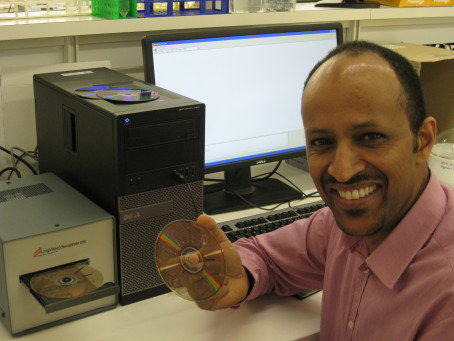Researchers have turned conventional DVDs into portable and cheap diagnostic tools for developing countries, and are now adapting their prototype into a workable medical device. A team led by Aman Russom of the KTH Royal Institute of Technology in Sweden has demonstrated proof of concept for the tool by testing for HIV.
Blood samples are loaded into micro-channels on a modified, semi-transparent DVD disc and scanned by a DVD reader, which has been adapted to detect light transmitted through the disc. The image can then be visualised on a computer screen.
DVDs and their readers are already produced on a mass scale, meaning that the device would probably cost about $200, less than a hundredth of the cost of standard tools used in HIV testing, such as flow cytometers.
DVDs themselves might be a dying product, but their manufacturing technology is well established and here to stay, according to Russom. “We’re trying to find a new use for a dying technology … the optics are superb; they have been fine-tuned over the past 30 years,” he says.
Jason Warriner, clinical director of the Terrence Higgins Trust, a UK-based HIV and sexual health NGO, agrees: “If you think a model or a system works and there’s low maintenance to it, then you can use it.”
He adds that lab-on-DVD could be advantageous in resource-poor settings but warns that the research is in its infancy and needs “a lot of investment and development”, including assessing its accuracy and making sure the device is appropriate for use in the developing world.
The proof-of-concept study was published online in Lab on a Chip this year.
Story Source:
The above story is reprinted from materials provided by Guardian UK Science.





